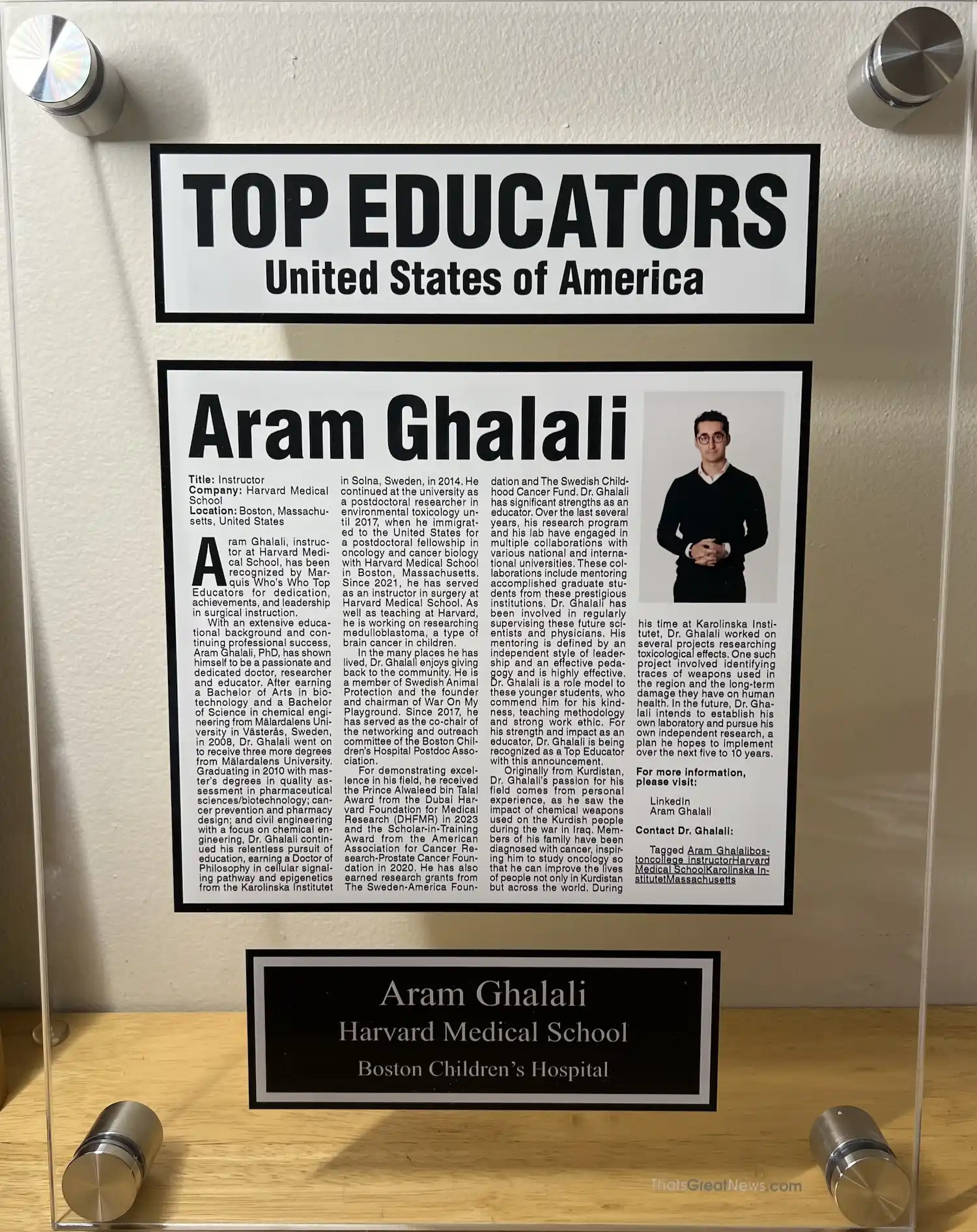Awarding Institution: Marquis Who’s Who in America in 2024.
Who is Eligible to Compete: This recognition is limited to individuals who possess professional integrity, demonstrate outstanding achievement in their respective field and have made innumerable contributions to society as a whole.
Selection Criteria: Every year Marquis Who’s Who America selects an elite list of the top three percent of the professionals in the world who have excelled in their fields. Individuals who have demonstrated longevity, leadership, and prominence in their field are eligible for this honor.
The award justification description:
Aram Ghalali, instructor at Harvard Medical School, has been recognized by Marquis Who’s Who Top Educators for dedication, achievements, and leadership in surgical instruction.
With an extensive educational background and continuing professional success, Aram Ghalali, PhD, has shown himself to be a passionate and dedicated doctor, researcher and educator. After earning a Bachelor of Arts in biotechnology and a Bachelor of Science in chemical engineering from Mälardalens University in Västerås, Sweden, in 2008, Dr. Ghalali went on to receive three more degrees from Mälardalens University. Graduating in 2010 with master’s degrees in quality assessment in pharmaceutical sciences/biotechnology; cancer prevention and pharmacy design; and civil engineering with a focus on chemical engineering, Dr. Ghalali continued his relentless pursuit of education, earning a Doctor of Philosophy in cellular signaling pathway and epigenetics from the Karolinska Institutet in Solna, Sweden, in 2014. He continued at the university as a postdoctoral researcher in environmental toxicology until 2017, when he immigrated to the United States for a postdoctoral fellowship in oncology and cancer biology with Harvard Medical School in Boston, Massachusetts. Since 2021, he has served as an instructor in surgery at Harvard Medical School. As well as teaching at Harvard, he is working on researching medulloblastoma, a type of brain cancer in children.
In the many places he has lived, Dr. Ghalali enjoys giving back to the community. He is a member of Swedish Animal Protection and the founder and chairman of War On My Playground. Since 2017, he has served as the co-chair of the networking and outreach committee of the Boston Children’s Hospital Postdoc Association.
For demonstrating excellence in his field, he received the Prince Alwaleed bin Talal Award from the Dubai Harvard Foundation for Medical Research (DHFMR) in 2023 and the Scholar-in-Training Award from the American Association for Cancer Research-Prostate Cancer Foundation in 2020. He has also earned research grants from The Sweden-America Foundation and The Swedish Childhood Cancer Fund. Dr. Ghalali has significant strengths as an educator. Over the last several years, his research program and his lab have engaged in multiple collaborations with various national and international universities. These collaborations include mentoring accomplished graduate students from these prestigious institutions. Dr. Ghalali has been involved in regularly supervising these future scientists and physicians. His mentoring is defined by an independent style of leadership and an effective pedagogy and is highly effective. Dr. Ghalali is a role model to these younger students, who commend him for his kindness, teaching methodology and strong work ethic. For his strength and impact as an educator, Dr. Ghalali is being recognized as a Top Educator with this announcement.
Originally from Kurdistan, Dr. Ghalali’s passion for his field comes from personal experience, as he saw the impact of chemical weapons used on the Kurdish people during the war in Iraq. Members of his family have been diagnosed with cancer, inspiring him to study oncology so that he can improve the lives of people not only in Kurdistan but across the world. During his time at Karolinska Institutet, Dr. Ghalali worked on several projects researching toxicological effects. One such project involved identifying traces of weapons used in the region and the long-term damage they have on human health. In the future, Dr. Ghalali intends to establish his own laboratory and pursue his own independent research, a plan he hopes to implement over the next five to 10 years.
For more information, click here.
